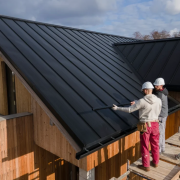Quick Projects That Keep Money in the Bank
These days, free really isn’t free. Especially for energy consumption in your home. The price for ultimate comfort and relaxation in your house truly takes a bite out of your budget. If you’re totally over expensive utility bills and ready for some financial relief, take a look at these top ways to save on energy in 2022!
1. Replace, Upgrade, or Maintain Your HVAC
Let’s start with the system that reigns supreme over your home’s environment – your heating and cooling system. Not only do you want to make sure your air conditioner is ready for summer, you also want to get your ductwork inspected and perform HVAC ductwork repair if needed.
Did you know that leaks in your air ducts can cause your home to lose up to 40% of your heating and cooling? Scheduling an HVAC inspection with an expert technician to replace, repair, or perform routine maintenance on your heating and cooling system can save you a lot of money on your energy bill.
To learn more about how you can improve the ductwork in your home and maintain your HVAC system, just search for “heating and air near me,” and schedule an inspection from highly rated professionals in your area. Or if you have a home warranty with HVAC coverage, be sure to make use of it to keep your HVAC system stay in working condition.
2. Get Residential Window Tinting
Yes, they make window tinting for your home! Not only is it just as durable as window tint for vehicles, it’s also a great way to reduce your energy costs. High-quality window film for your home filters out about 99 percent of UV rays, which heat your home and destroy your interior furnishings.
Because of its insulating capabilities, residential window tint also stops the heat produced by your HVAC from escaping through your windows. That means your heating and cooling system won’t have to work as hard to keep your home at the perfect temperature, and you can keep money in your bank account.
One of the best parts about residential window tint film is that you can choose a variety of shades and styles to suit your design aesthetic. You can even have a professional apply decorative window tint to add a little extra curb appeal to your home.
3. Install a Smart Thermostat
Other than being incredibly convenient, smart thermostats offer a lot of energy savings. Replacing your old digital thermostat with something smarter allows you to set a narrower comfort level, which stops your HVAC system from overworking.
The most advanced smart thermostats can “learn” your daily routine, and automatically adjust the temperature to suit your routine at different times of the day. That means you can increase the temperature before you get out of bed in the morning, and cool your home down when you’re getting ready for bed.
There are smart thermostats that work with every budget, but they don’t work with every HVAC system. Check with a professional about the compatibility of a smart thermostat and your HVAC unit before you attempt to install it.
4. Switch to Energy Efficient Lighting
While traditional incandescent light bulbs are super cheap, they actually cost quite a bit to operate. In fact, one incandescent light bulb cost 10 times more to power than it did to purchase it. They don’t last very long, either.
LED and CFL light bulbs offer at least 1,000 more hours of light than a traditional incandescent, and they cost a lot less to operate. You can even purchase smart bulbs that change colors at the touch of a button, or with your voice assistant like Google or Alexa.
Smart bulbs can even be turned on and off with your voice, which means you can control both your thermostat and your lighting from the comfort of your couch.
5. Small Steps Have a Big Impact on Energy Cost Savings
Even though these steps are a great way to start saving money on your energy bills, it’s the small things you do regularly that really have a big impact on saving energy. For instance, “vampire appliances,” appliances that you keep plugged in but don’t use, can account for almost 20% of your monthly energy bill.
That’s because they still draw power even though they aren’t technically turned on. Even household items like desk lamps and garage door openers use electricity when they are turned off.
Unplugging things like your phone charger and powering down things like your computer when you’re not using them can save you money in the long run.
Save the Planet and Your Bank Account by Cutting Down Energy Use
Perhaps the biggest perk of reducing the amount of energy you use in your home is that you’re reducing your carbon footprint. However, you can find ways to reduce your energy consumption outside of your house, too. That way, you’ll always be saving the planet and money in the bank 24/7.
Infographic Provided By Solar Panel Installation Company, Sunburst Solar













[…] your car, your home appliances need to be serviced regularly as well to keep them running properly. For example, you […]